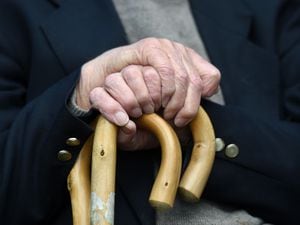Steroid injections trial offers fresh hope for patients with hip pain
Patients with osteoarthritis of the hip currently have ‘limited’ treatment options.

Patients with hip pain might benefit from an injection of steroids directly into the affected joint, a trial has suggested.
The finding could offer fresh hope for patients with osteoarthritis of the hip, who currently have “limited” treatment options, researchers said.
The study involved 199 adults over the age of 40 whose hip osteoarthritis gave them a “moderate” amount of pain.
A third received usual care, another third were given standard care and an injection of a steroid with a local anaesthetic into the hip, which was administered using ultrasound technology, and the final third received an injection of local anaesthetic plus usual care.

The researchers, led by experts at Keele University in Staffordshire, examined levels of hip pain for six months.
Patients who had the steroid injection were more likely to report an improvement in pain levels after six months.
Participants were asked to rate their pain on a scale of one to 10, and over six months participants who had the steroid injection reported a greater reduction in pain intensity.
Pain levels reduced by 1.4 points compared with patients who received standard care, and by 0.5 points compared with those who had an injection of local anaesthetic.
The group who received the steroid injection reported greater overall improvement in pain and physical function and quality of life as well as being less likely to miss work due to pain.
Greater differences were found at two weeks and two months after the injection, compared with four and six months later.
More participants in this group reported being “recovered or much better” compared with those who received current care after two weeks and two months, but there was no significant difference four months after the injection.
The authors concluded: “In patients with mild to moderate hip osteoarthritis, ultrasound guided corticosteroid and local anaesthetic injection with advice and education led to greater pain reduction and improvement in function over six months, compared with advice and education alone.
“These findings provide evidence to inform international guidelines and offer important choice to patients, who often believe their treatment options are limited.”
But they cautioned that a patient in this group with a pre-existing prosthetic heart valve died from a bacterial infection four months after the injection, which was deemed “possibly related to the trial treatment”.
They said hip osteoarthritis is a leading cause of disability, and prompted 90% of the 100,000 hip replacements conducted in the UK in 2019.
Not all patients with hip osteoarthritis require surgery and many are treated by their GPs for many years before they are referred for surgery.
But evidence suggests primary care management of the condition is “suboptimal”, the authors said.
Current guidelines suggest a combination of medication and non-drug treatments, with education, exercise and weight reduction as core treatments.
The guidelines say current evidence on the use of a steroid injection into the joint is limited and conflicting, which is why the academics in the latest paper, published in The BMJ, set out to examine whether the procedure provided benefit.





